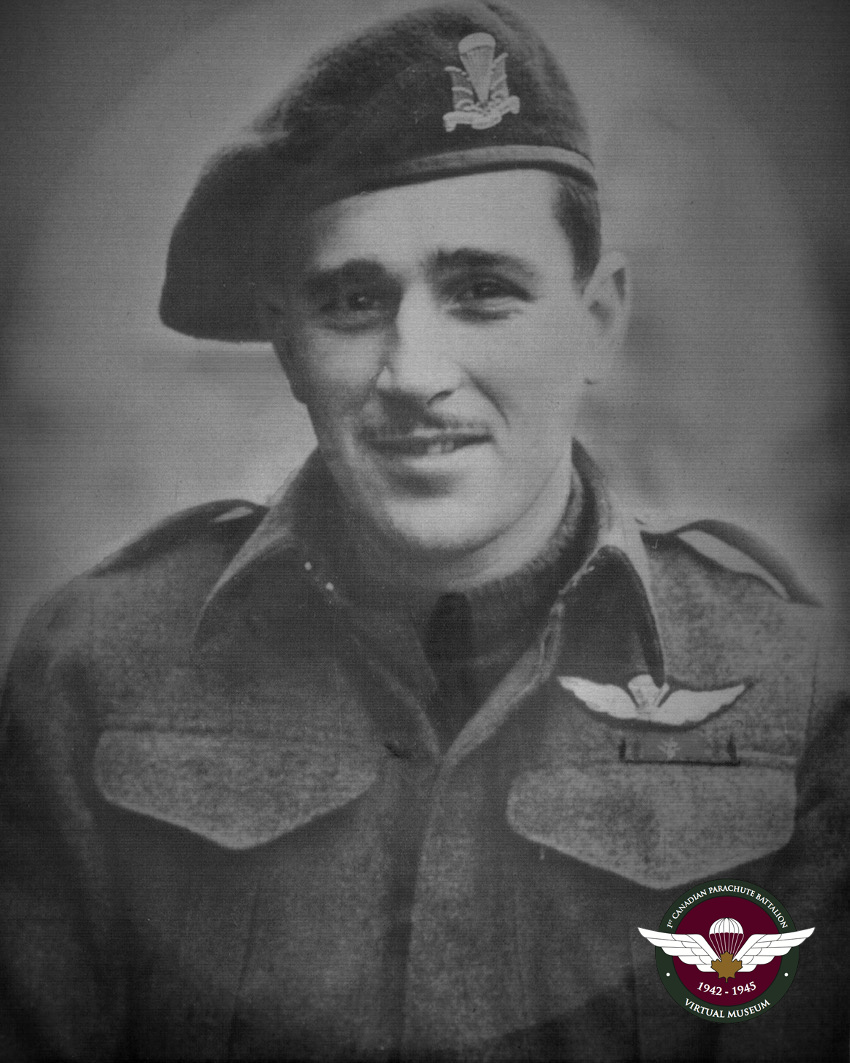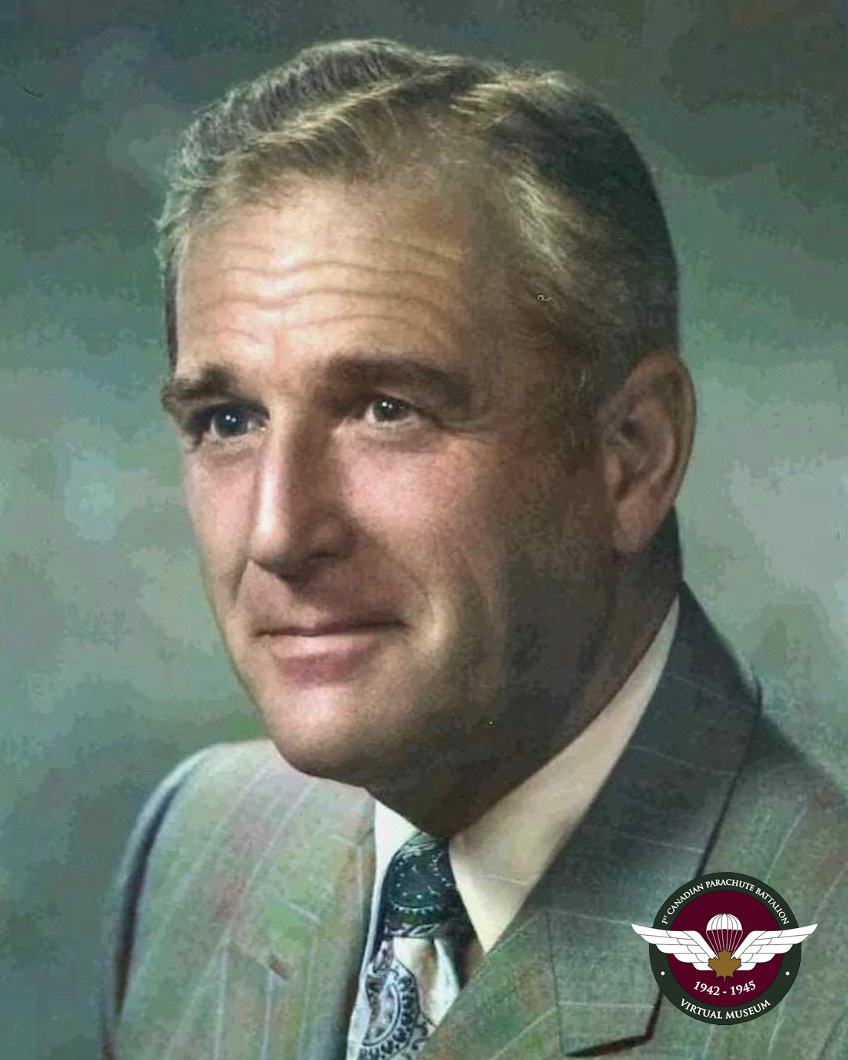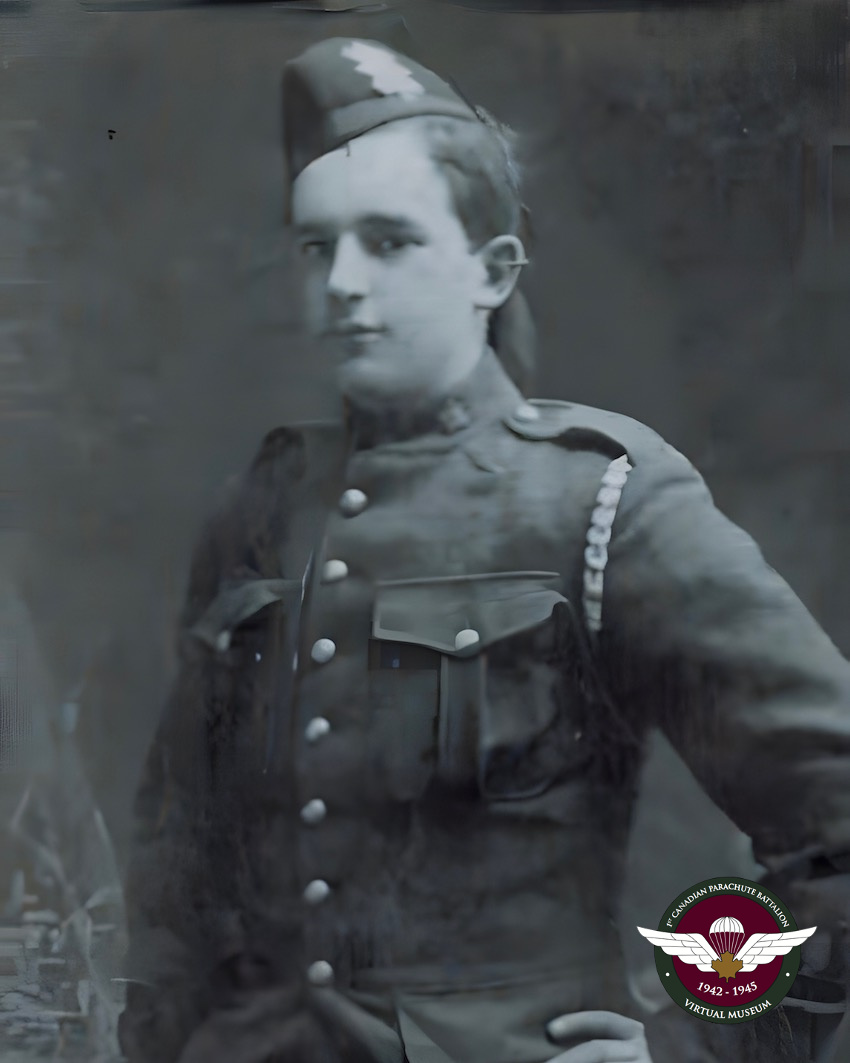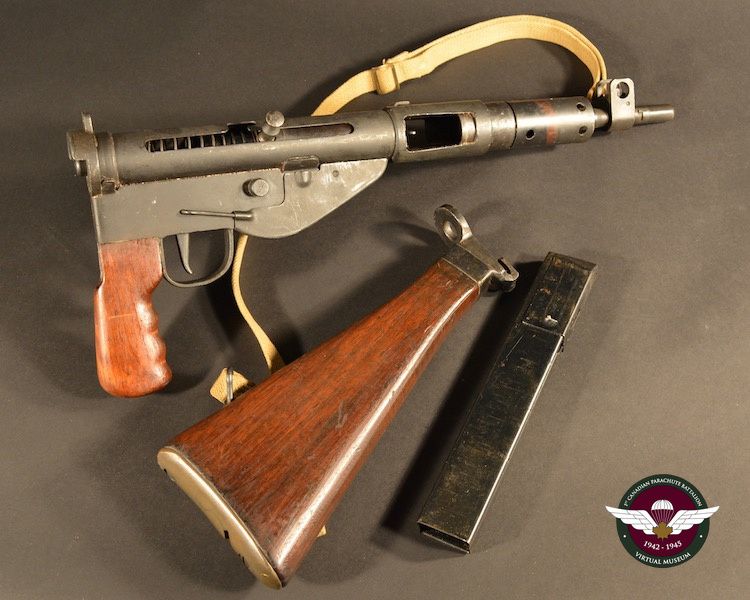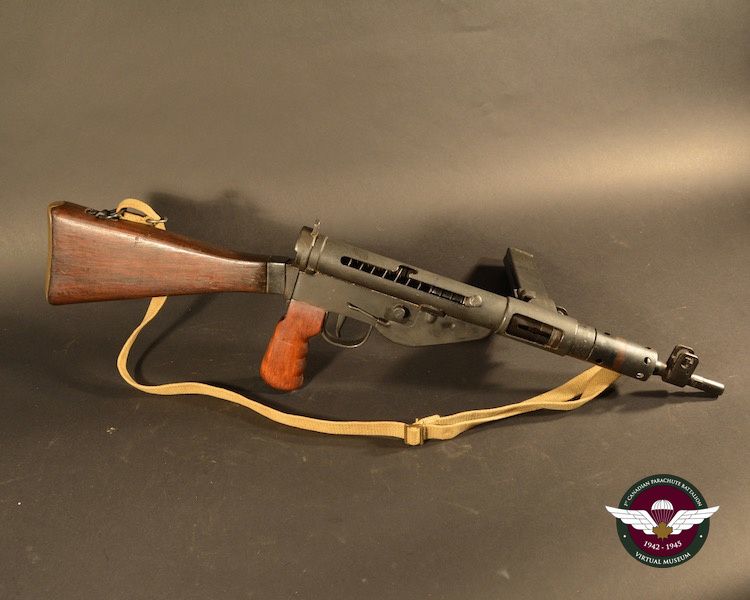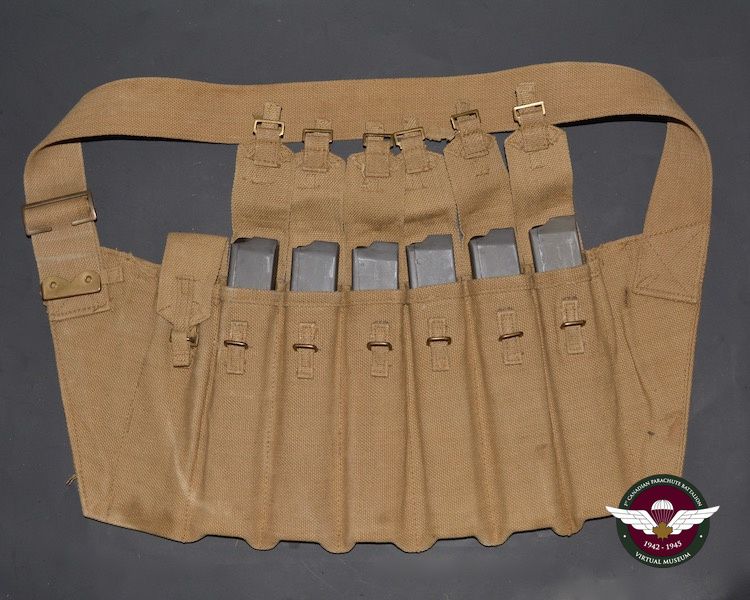Lieutenant Eric L. Burdon
Eric Leslie Burdon was born on October 13th, 1921 in Moncton, New Brunswick to his parents, Walter M. Burdon and Alvaretta Bleakney. Eric attended high school in Moncton. He worked several jobs before eventually joining the military, serving briefly with the New Brunswick Rangers before World War II. Eric’s father, Walter M. Burdon had previously served in the Canadian military from the age of 17. Walter saw action during World War I while serving with the Black Watch Regiment. He was gassed and bayonetted at the Battle of Ypres and taken prisoner by the Germans. After the war, Walter moved to Moncton, New Brunswick, where he spent a considerable amount of time in a sanatorium, due to his injuries from the war. This is where he met his future wife, Alvaretta.
World War II was in full swing and Eric took notice of the recruiting campaign and saw the opportunity to join the military a second time in the hope of serving overseas. He enlisted with the Carlton and York Regiment in 1940 and began training at Kentville, Nova Scotia. He later transferred to the Cape Breton Highlanders in 1941 and then travelled to England where he was promoted to the rank of Sergeant. During that same year, Eric met and married his soul mate Mildred (Mid) G. Baltzer in Kentville, Nova Scotia on July 17th, 1941. They had their first child, a daughter Cheryl, born in 1943.
Eric showed much promise in the military and was encouraged to join the officer ranks. He returned to Canada for Officer training in Brockville, Ontario where he was promoted to the rank of lieutenant. Eric learned about the paratroopers and eagerly volunteered. He successfully completed the battery of physical and psychological testing and then was accepted into the training program. Eric graduated from his parachute course on January 14th, 1944 at Shilo, Manitoba. A short time later, he departed for Carter Barracks, Bulford Military Camp on Salisbury Plain in Wiltshire, England. He joined the 1st Canadian Parachute Battalion and began training with the 6th Airborne Division and was assigned to C Coy, 7 Platoon.
On June 5th, 1944, Eric boarded an American C-47 airplane, and in the early hours of June 6th, he parachuted into Normandy in the dark. Eric and his men landed miles away from the designated drop zone due to enemy anti-aircraft fire causing the pilot to perform evasive flying maneuvers, taking them miles off course. Upon landing, they faced intense fighting, while trying to make it to their objective. Fortunately, Eric survived the D-Day invasion and the Battalion made its way back to England to take on replacement troops and train for the next mission.
In December of 1944, Eric travelled with the Battalion by sea to Ostend, Belgium where they were transported by truck to the Ardennes to participate in the Battle of the Ardennes, better known as the Battle of the Bulge. The Battalion then made their way back to the south of Holland, then to Ostend to board a ship to travel back to England. Once back in England, the Battalion regrouped and continued to train for the next mission. On March 24th, 1945, Eric would parachute into Germany with the Battalion during Operation Varsity which was a daring daytime drop onto an active drop zone under enemy fire.
Eric shared many interesting stories from his service with the Battalion overseas, with his children:
During Operation Overlord
Eric was on patrol when he came under fire from a hidden German machine gun nest. While running away he was struck in the pack multiple times but none of the bullets penetrated. He was taken prisoner and sent by truck behind enemy lines and was imprisoned inside a temporary wire enclosure amongst other prisoners. He met up with a British parachutist and they decided that they would attempt an escape during periods when the gate was opened to admit a new truckload of prisoners. On one such occasion, a truck created a large cloud of dust and both of them simply walked out the main gate and kept walking until they were a distance from the enclosure where they began to run for cover. Over the next three days, they travelled at night back to the Allied lines. Unfortunately, the British parachutist was killed by a German sniper when he came around a hedgerow. Eric was not spotted and eventually returned to his unit.
During Leave in London, England
After D-Day and several weeks of fierce fighting what was left of the Battalion returned to England for rest and replacements. Eric was one of the few officers to return and despite his adventures was unharmed except for some small shrapnel wounds. He took advantage of his leave to travel to London and was sightseeing when from across the road a British high-ranking general staff officer yelled at him to stop. The British officer crossed the road and began berating Eric about the fact that his battledress collar was unbuttoned. Eric concluded that this officer was a desk jockey and took offence at such a big deal being made over a trivial issue and rather rudely to the British officer to go F**K himself. He was promptly arrested by the military police. After being detained, he was returned under guard and paraded in front of Brigadier General Hill (whom Eric admired immensely). There were several other officers in the room and Brigadier Hill tore a strip off Eric and made him quake in his boots. Hill then ordered everyone out of the room but ordered Eric to stay. He figured he was really going to get it. Brigadier Hill walked up to within an inch of Eric’s nose and said quietly. “Did you really say that to a general staff officer?” When Eric answered “Yes sir I did!”, Hill went quiet and smiled, and then quietly said “Burdon…. you’re alright you know! He then shouted at the top of his voice “Get the hell out of my sight”!
During Operation Varsity
On a reconnaissance mission, a platoon crossed the Rhine at night to check out the German defenses. They came across a small village and observed a German guard hut on the far side of a deep but narrow drainage ditch. Like clockwork, every 20 minutes, a German soldier would cross the drainage ditch on a makeshift plank arrangement and return to the hut and immediately another German would leave the hut and cross the same plank and go into the village.
Upon return, they gave their report and were instructed to return the next night to secure a prisoner for interrogation. Upon arrival, they pondered the best way to make the capture. They crawled along the drainage ditch until they were under the plank and waited. Shortly afterward they heard a German coming from the village and he crossed the plank and went into the hut. On cue, a soldier left the hut and proceeded to cross when the plank was pulled out from underneath him, and before he could utter a sound he had a knife at his throat. The prisoner was successfully brought back across the Rhine for interrogation.
About Fred Topham VC
Eric witnessed Topham’s heroic deeds. He watched while Topham rescued several wounded men while shot through the nose and in terrible pain. Later that same day after refusing any medical aid himself he removed two injured soldiers from a burning ammunition carrier with ammunition going off. Eric ordered everyone to stay away from the burning vehicle as it could have blown up at any moment but Topham performed his heroic feat despite the order. This left him with a real quandary. He could have had Topham court marshalled for disobeying a direct order, but he did not since he thought it was the bravest thing he had ever witnessed in his life.
After the war, Eric returned to Canada and he and Mid expanded their family with two more sons – Peter in 1946, and Hugh in 1954. Eric, Mid, and their family lived in many places in Canada - Moncton, Sydney, Montreal, Oshawa, Calgary, Vancouver, and Toronto as they followed Eric's successful career with General Motors. They spent some of their happiest times on their retirement farm in Demorestville, Ontario, where they had many friends, and enjoyed being involved in their church and the communities of Prince Edward County. Eric passed away on October 11th, 2001 in Picton, Ontario, and was laid to rest at the Newmarket Cemetery.
If you have taken the time to read the biography of Eric Leslie Burdon, then you have kept his memory alive. We thank you for that.
Pictures and information courtesy of Hugh Burdon.
Sten MkV
Lieutenant Burdon would have carried a Sten MkV submachine gun overseas, similar to the one shown below. The Sten can be found in several models, the one pictured here is a Sten MKV, produced for the Paratroopers. It was an inexpensive firearm to produce, costing less than $10.00 per unit. It chambered a 9mm cartridge with a firing rate of 550 rounds per minute and an effective range of 100 yards. Also shown is a magazine pouch or bandolier that allowed a soldier to carry additional 30-round magazines. Courtesy of Collectors Source.
